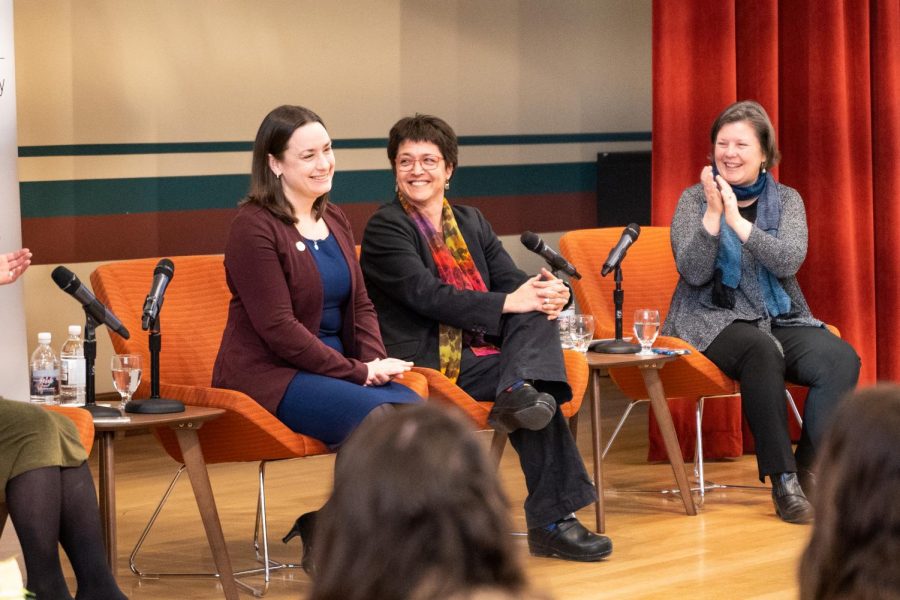On Monday, the University of Massachusetts hosted a panel of female legislators from around western Massachusetts to speak about the issue of gender representation, among others, in the legislature and the public service sector.
The event was titled “Women Leading Western Mass” and was co-hosted by the School of Public Policy and UMass Women into Leadership. The panel featured Sen. Jo Comerford and state representatives Natalie Blais, Lindsay Sabadosa and Mindy Domb. Comerford, Blais and Sabadosa are all the first women to hold their respective positions.
Alasdair Roberts, director of the School of Public Policy, said the event was a great way for students to learn about the various professional paths of legislators and create professional connections. He explained that a major focus of SPP’s curriculum is positive social change.
“We’re proud to have many women leaders among our alumni and our student body,” Roberts said.
When asked about how her gender impacted her run for state representative, Sabadosa said “There were definitely women candidates when I was young…that didn’t run as women…But that matters because it impacts how I view the world. It impacts how I view policy, and it really impacts how I interact with other human beings.”
The panelists discussed this topic further, telling stories of times when they were asked about how campaigning would impact their family life and when they found themselves to be the only female legislators in a room.
“When you’re starting to notice those things, you definitely think ‘who’s voices aren’t being represented?’” Sabadosa said.
Responding to a question from the audience, the panel also addressed the issue of racial inclusion within the state government. Domb encouraged the audience to reach out to their legislators about policy issues and concerns.
“We need to make the face of the State House to look like the face of Massachusetts,” Domb said.
Comerford described a conversation she had with the Senate president, commenting on the overwhelmingly white majority within the State House.
“We have to do something. We have to take responsibility in the Senate for recognizing that we ourselves as elected officials are vastly majority white and, in fact, our teams are vastly majority white… I suggested we share a commitment in the Senate to increase the diversity of our teams,” Comerford said.
The panel also spoke about what they felt Massachusetts government and politics should look like.
Blais commented on the relationship and communication between constituents and their representatives, saying “It is important for each of you to come to the State House…and for it to be normal, acceptable, cherished and celebrated.”
Comerford also shared a similar sentiment, saying “I believe…that the government can and should work on behalf of everybody.”
Toward the end of the panel, the legislators were asked to give advice to any students considering a career in public service.
“Do it. Really do it. If you’re doing it because you believe, and you’re feeling compelled and committed to being involved and engaged with our community, working with other people, understanding other people…do it,” Domb said.
“Let your passion lead you because that is most reflective of your authentic self, and that’s what people want. That’s what we seek…If there’s an issue you’re passionate about, let that be what guides you,” Sabadosa said.
The SPP also offers a Beacon Hill Project that brings students on monthly trips to Boston to meet with their elected officials and others involved in policy.
UWiL accepts applications for their leadership program each August.
Irina Costache can be reached at [email protected].





















Ed Cutting, EdD • Jan 29, 2019 at 1:20 pm
Making the State House look like Massachusetts would be interesting.
First, only two in five would have a 4-year college degree, and only one could be a lawyer, as lawyers are 1:300 in the population. as are non-union long-haul truck drivers, so they’d have to have one of those as well.
.
Half of them would be women (as these women suggested) but half of those would have small children and the only politician who had small children was Acting Governor Jane Swift (2001-2003) and that didn’t work out so well…
The problem is that a professional single woman who has never been married and who has no children isn’t representative of a married (or divorced) woman with 1.9 children.
A professional single woman with a graduate degree(s) is not representative of the 60% of women who don’t have a college degree.
And the reason we have a 21-year-old drinking age is that there aren’t any 18-year-olds in the legislature….
A legislature that “looks like Massachusetts” would be an interesting concept, although quite different from what I think these women were talking about….
peter most • Jan 29, 2019 at 9:11 am
Question…. Is there legislators and a conference umass hosting for men????
Someone should look into filling a DOE civil rights complaint against umass, for selective gender discrimination. You don’t even have to be a student or work here to file a complaint, one was successful in Michigan for an university that had programs which only benefited women and not women and men.(which umass practices alot of gender discrimination and on an institutional level._
Umass can become an example that gender discrimination shouldn’t be tolerated. Liberals think it is okay to discriminate against men.. but it’s not. As a society we need to have zero tolerance for prejudice or discrimination of any kind.